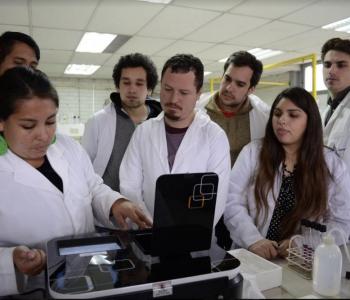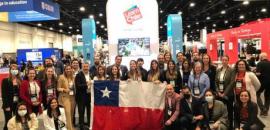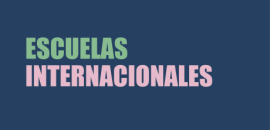Se encuentra usted aquí
A comprehensive training for engineering students: educating specialized, creative and socially responsible actors

Thursday, March 5, 2020
Just like all disciplines, engineering responds to the current cultural and socio-political structures. In ancient times, engineers played the role of architects, builders of fortresses, temples and cities, road surveyors, war weapons designers and specialists in farming systems. The use of the ingenuity and the ability to create project building for people and political purposes are the common component for all those different facets.
Only with the Scientific Revolution of the 17th century and, later, with the Industrial Revolution of late 18th century, engineers are seen as experts in problem solving. Despite this turn to social awareness, engineers have always assumed political functions throughout history; in other words, they have played an important role as change agent within the current social order.
In Chile, during the forming process of the Republic, engineers -mainly men until mid-20th century- were key actors for the State initiatives to reach out communities. Some examples are the emergence of the volumetric measurement of water in liters per second, instead of the "water sprinkler", or the decimal metric system, which imposed the kilos and hectares on previous measurements such as bushels and squares.
The training model of elite engineers that emerged in the 19th century strengthened liberal-productivity projects such as infrastructure buildings and extractive industry activities, producing socio-political transformations in communities, especially with the progressive influence of a type of modern rationality that deals with communities’ expertise by subordination, at least on the formal level.
The foundation of the Universidad Técnica del Estado (UTE, Technical University of the State) in 1947 represents a turning point for public higher education. Certainly, the university came to respond to the challenge that our country assumed within this development project. Furthermore, the UTE represents a historical milestone; the Mining and Industrial Students Federation (FEMICH) –mainly composed by students from working class families– had a political and social achievement by obtaining for the first time college degress after a long-standing demand.
During the period of the civil-military dictatorship that begins in 1973, the efforts of the state body to reduce key action areas on organized civil society highly affected the recently named Universidad de Santiago de Chile –from 1981. The training curriculum for engineering students had a few setbacks in the socio-political aspects and those related to the community reality, bringing some type of technical training not much related to the teaching-learning process and the problems that the market had as main mechanism of social coordination, especially for impoverished inhabitants and communities.
Since then, almost half a century passed by and, today, within the social crisis, we have the challenge to rethink the training process of engineers for this new era.
Challenges in teaching a comprehensive engineering
In this context, high-level instruction and hyperspecialization of engineering disciplines currently coexist in the training of engineers at USACH, along with the gradual reopening of spaces for discussion and critical thinking about university activities and its impact on the country.
This is more than a productive gear, we have set ourselves to train professionals who are capable to understand social problems from a more complex and multidimensional perspective. The bet is as high as it is necessary: to overcome the uncritical and privatized education that today survives and to move towards an education of engineers as a whole, specialized professionals, not only for the expert handling of a set of techniques, but also for their ability to creation and collaboration with other citizens.
This necessarily implies training with multidisciplinary components that allow strengthening the creative ingenuity of engineers and putting them at the service of the common good, learning to look at multiple scales with a multiplicity of actors.
Local and socially responsible engineers
The principles of collaborative work, activities on communities and social co-responsibility with global and local events are the fundamental base that allowed the creation of the international schools at the Universidad de Santiago de Chile with the purpose of adding the "think and act globally" elements on issues purely engineering.
These schools are part of the Continuing Education offer and where the education of engineering students is in the spotlight, taking into account the development of critical thinking based on the treatment of all-sectorial situations that today constitute global challenges for more interconnected societies.
These complex interdependencies on territories represent the proper scenario to relocate engineering in a knowledge-based economy, which recognizes the interaction among the university, industry, governments, civil society and the environment, concepts associated with the well-known triple helix model of innovation. In this context, internationalization is an additional helix impossible to dissociate when we talk about complex developments related to engineering.
Our international schools are focused on training students with conceptual and methodological tools that broaden their disciplinary horizons and contribute to the development of new perspectives and understanding of the world, including stakeholders who normally do not have access to traditional education in engineering. These actors aim to boost the specialties and creativity on students with a comprehensive perspective of global citizen education.
The first version of the International School for Sustainable Development and Circular Economy was held in July 2019, with the participation of four countries from Latin American, European and Oceanian universities. This school sought to identify technical, social, political and cultural aspects in the engineering practice and public policies respecting with areas of energy, pollution and circular economy at local and international level.
For the year 2020 there are two confirmed schools that will be developed during the months of July and August. International School of Engineering and Society: this school aims to consider the role of engineering in a systemic crisis and social fractures context, taking into account the analysis of development and governance models in the Americas. And the International School Perspectives and Analysis of Seismic Hazard Management that focuses on modelling and analysing seismic resistant structures, considering civil society for new risk mitigation plans management.
The staff of academics and guests that include the schools programs represent the multidisciplinary spirit of their mission. This is an activity where engineering, social sciences, economics and humanities are included, through dynamic and experiential teaching-learning resources used on workshops, field trips, audiovisual resources and debates.
Even though it is not easy to achieve, the purpose of the schools is clear: to boost engineering students’ capabilities with curricular and extracurricular training, to understand the engineering discipline in a complex way and to apply new ideas to start building worthy countries to live in and social welfare for their inhabitants.
Written by Dr. María Teresa Santander G., Dr. René Garrido L., Karin Baeza V. and Cristian Díaz C.
Translated by Javiera Díaz



